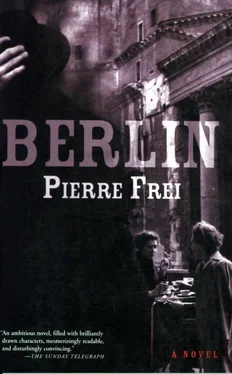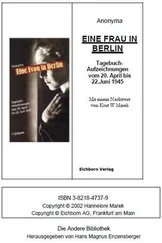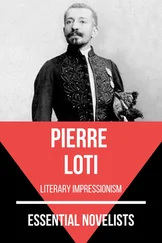'We can handle this in a civilized manner. So once more — who are you? Secret Service? British Military Intelligence?'
'Je ne comprends pas, monsieur.'
The interrogator swung his arm back, ready to strike. It froze in midmovement, Marlene too stood as if paralysed.
Fredie was the first to recover. 'Hello, darling, what a surprise. Who'd have expected to meet you here? Well, never mind. Some things sort themselves out.' Marlene looked at the cell door. 'Don't bother. You'd get no further than the foot of the steps. You just stay here and listen. I could send you to Auschwitz on the next transport. Or much nicer, arrange a date for you with the executioner. I must tell you that Monsieur de Paris, as they call him, works fast and with precision. Of course if you like he can strap you to the board slowly and elaborately. That'll pass a few chilly minutes until the blade finally falls.' Fredie was relishing every word.
She had got control of herself. There was total contempt in her voice. 'Still the same old bastard, Fredie.'
'Brigadefiihrer Neubert, if you please. That is to say major-general. Blumenau is a thing of the past. They've appointed me head of the Gestapo here in Paris. Now and then I conduct interrogations personally.' He gave a nasty grin. 'So as not to get out of practice.' Her glance fell on his belt and holster. 'No, darling. You're not quick enough for that.' With one stride he was beside the camp bed.
The couple of seconds were enough. She got her hand on the Beretta in her shoulder bag. Armand had practised the movement with her. She shot right through the leather. The bag and its contents muted the sound of the shot. Fredie fell on his knees. He looked up at her imploringly, about to say something. Her second shot hit him in the middle of the forehead.
She acted fast and with circumspection. She undid the cord, and the prisoner rubbed his wrists. In her excitement she spoke in German. 'Quick, put this on.' She threw him Fredie's coat.
The man understood. He buttoned the coat up to his chin, buckled the belt round it and put on the cap with the death's head. Luckily he was wearing grey trousers and black shoes. 'You keep quiet, I'll do the talking.' He seemed to understand that too.
They approached the grating. 'I'll see the rest down here another time. Come along, Herr Brigadefuhrer. We must celebrate meeting again like this.' Marlene kept up an uninterrupted flow of talk. 'How's your wife? It seems for ever since I last saw Nina. Monsieur Gaston, allez.' The little caretaker trotted after them. And your sheepdog Harro?' Up the steps, not too hastily. Marlene forced herself to keep calm. 'Such a nice creature.' One step at a time, over the black and white stone flags of the ground floor and so to the open double door. Another guard. 'What do you say to a glass of champagne in the Ritz, Herr Brigadefiihrer? It's not far on foot, and we can have your car follow us.' Out in the street at last. Stroll calmly on. Then a dive round the corner. A sigh of relief.
The man she had rescued dumped his disguise in a doorway. Bertrand's bicycle taxi skidded into view on the wet carriageway. They were safe.

Sleep, sleep was all she wanted. After twenty-four hours Armand broke the silence in the glasshouse. 'Get up, Madeleine, you have to get out of here. They're looking for you everywhere. You not only killed the head of the Paris Gestapo, it so happens that you rescued one of our most important men in the process. We're taking you to Provence. You'll be safe there until the war is over.'
They played marches, Resistance songs, and over and over again the Marseillaise. The Parisians hailed the soldiers who had liberated them. The tall, thin general stood on a podium above the jubilant crowd. Armand, in the uniform of a colonel in the Free French forces, stood beside him. 'Madeleine, mon general,' he introduced her. The tall, thin general embraced Marlene and pinned an order to her blouse.
She climbed down from the podium and stood in line with the others whom the general had decorated. The woman next to her had been given the cross of the Legion d'Honneur too. She wore American uniform. 'What's your name? Where are you from?' she asked in a husky voice.
Marlene reverted to her native accent. 'I'm Marlene. Berlin born and bred.'
'Me too,' said her neighbour.
The general is greatly impressed by your story,' Armand told her. 'He'd like to know if there's anything that we can do for you.'
Marlene didn't even have to think about it. 'I want to go home.'
The DC3 with French markings on its fuselage and wings made a bumpy landing. There were great cracks in the runway and only some of the bomb craters had been filled. The Americans had occupied their sector of Berlin a few days earlier, taking over Tempelhof airport. As yet the French had no airfield in their sector.
Marlene climbed out of the plane. An elegant Spahi officer was waiting for her. 'Capitaine de Bertin, madame. I'm to look after you while you are here. We've put you up in the guest house at our headquarters, and you can decide when you want to return to Paris.' Capitaine de Bertin put her case in the big staff car.
'I don't want to go back to Paris. I want to go to RUbenstrasse.'
'What, madame?'
'RUbenstrasse, please.'
The captain was a veteran of many diplomatic missions, but this complicated task was executed only after much discussion with the driver, and with the aid of several German workers. At last they set off, passing ragged men and women making for unknown destinations. Others were busy clearing rubble. Children with hungry faces reached their hands out to the car. 'Chocolate,' they begged. 'Chocolate.' There were ruins everywhere.
Marlene wept. This was her city.
There was no Ri benstrasse any more, only a lunar landscape of broken bricks and rubble, with a single chimney rising from it three storeys high. Oh well, she thought, and wiped her tears away. 'Arretez, s'il vous plait.' They stopped. 'I must go on from here alone.'
Capitaine de Bertin gave her a card. 'You can reach me any time at this number.' He helped her out of the limousine and saluted. 'Goodbye, madame. You are a very brave woman.' The car disappeared in a cloud of dust.
Marlene took her case and set off. She knew she had made the right decision.

Only the entrance of the building in Schoneberg was left. 'The Reich family now in Lichtenrade,' someone had chalked on the charred wood of the door, adding the address. A dozen tenants had left similar information. Franz Giese was not among them.
Marlene clambered over the ruins to the place where the stairs had led up into his building. Dandelions grew among the rubble. Something glinted gold among the broken bricks and scraps of mortar. It was the rutting stag in the autumnal wood. She picked the last splinters of glass out of the frame and stuck the picture under her arm. Now what? Obvious. Look for Franz.
She slept in the park. She had a dried sausage in her case, and ate some of it for breakfast. A hydrant supplied washing water in the morning. 'Tastes horrible, but it's drinkable,' an old man told her, slurping it noisily from the hollow of his hand.
EMPLOYMENT OFFICE — the notice hung on a side door of the Schoneberg town hall which was still almost intact. She joined the end of the long queue. After two hours she reached a table.
'Name?'
'Kaschke, Marlene.'
'Papers?'
She gave the man her old passport, the one she had kept through the years.
'It's expired.'
'I'll get a new one before my next luxury trip round the world. Now I need work and somewhere to live.'
Читать дальше














